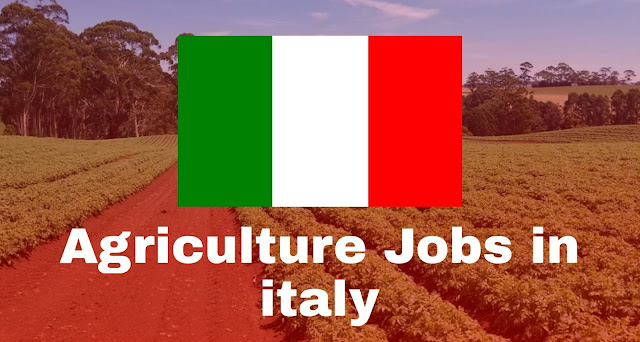Agriculture jobs in italy for Locals and foreigners
Italy, with its picturesque landscapes and rich agricultural heritage, offers numerous opportunities for both locals and foreigners to work in the agricultural sector.
Agricolture jobs in italy
Agriculture has long been a cornerstone of Italy's economy and culture. The country is renowned for its vineyards, olive groves, and diverse crops. In recent years, Italy has opened its doors to a growing number of migrant workers to address labor shortages in the agricultural sector. This industry encompasses various activities, including fruit and vegetable farming, viticulture, and livestock farming.
Advantages of Agricultural Work in Italy
Beautiful Scenery: Working in Italy's countryside provides an opportunity to immerse yourself in its stunning landscapes, including rolling vineyards, lush olive groves, and charming rural villages.
Cultural Experience: Engaging in agricultural work allows you to experience Italy's rich cultural heritage and traditions firsthand. You can participate in local festivals and events, enhancing your cultural immersion.
Seasonal Opportunities: Many agricultural jobs in Italy are seasonal, which can be ideal for individuals seeking short-term employment or seasonal work to supplement their income.
Skill Development: Working on farms or vineyards can teach valuable agricultural skills, which can be applied in various contexts and potentially lead to career advancement.
Average Wages in Agricultural Work in Italy:
Salaries in the agricultural sector can vary based on factors such as location, job type, and experience. On average, agricultural workers in Italy can expect to earn between €7 to €10 per hour. Skilled workers with experience may earn higher wages. It's essential to research specific job listings to get a more accurate picture of potential earnings.
Job Opportunities in Agricultural
To find agricultural job opportunities in Italy, you can explore various channels, including job portals, local newspapers, and websites of agricultural associations. Additionally, you can contact local farms or vineyards directly to inquire about employment opportunities. Here are some resources to get you started:
Green Jobs Italy : www.greenjobs.it
EURES - The European Job Mobility Portal : www.eures.europa.eu
Local agricultural cooperatives and associations
FAQs
Frequently Asked Questions (FAQs)
Do I need special qualifications to work in Italian agriculture?
While formal qualifications are not always required, prior experience in farming or agriculture can be beneficial. Some positions may require specific skills, such as pruning vines or operating machinery.
Are there accommodation options for agricultural workers?
Some employers provide accommodation for seasonal workers, but this varies depending on the employer and the specific job. It's essential to inquire about accommodation when applying for a position.
Can foreigners work in Italian agriculture?
Yes, Italy welcomes foreign agricultural workers, especially for seasonal positions. It's essential to have the necessary permits and documentation to work legally in the country.
Are there language requirements for agricultural work in Italy?
While Italian language skills can be an asset, some employers may hire non-Italian speakers, especially for manual labor positions. However, having basic Italian language skills can improve your job prospects and overall experience.
Conclusion
Working in Italy agricultural sector can be a rewarding experience, offering a unique blend of cultural immersion, skill development, and a connection to the country's rich agricultural heritage. With the information provided in this guide, you can explore the possibilities of pursuing a fulfilling career in Italian agriculture, whether you are a local or an expatriate looking for an adventure in the countryside.

